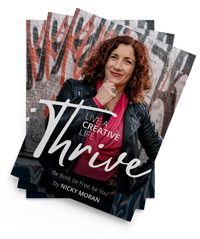At my next Trailblazer Tribe Live event on 29th January 2019, I will be looking at how to stand out and have impact. I’m running the event with storytelling expert Beverley Glick. In the run-up, I will be having conversations with her about some of the things that can get in the way. The first topic is: the curse of niceness.
So – If you’ve ever been called ‘nice’ – and most of us have, at some point in our lives – you may feel as if you’ve been damned with faint praise. Being nice – agreeable, pleasant, easy-going – is a good thing, some of the time. But sometimes it can be a curse, especially when you’re a creative type who wants to be seen and heard.
I say:
I realised early on in life that I had a natural ability with people and being nice was a big part of being a charmer. (The Charmer is one of our Trailblazer Tribe archetypes – take the quiz here to find out which one you lead with.)
At the tender age of 18, I worked over the summer at BBC Radio Merseyside and was sent out to interview a bunch of OAPs at a talent competition. (I know – a hard-hitting story!) Using my skills to be kind and friendly, I encouraged my interviewees to sing, tell me jokes and unpack their feelings about the day. My first story was a hit – and it showed me how my charm could disarm.
However – like many charmers, I also realised that this side of me could be a curse. I remember sitting in a room full of journalists who were all coming up with story ideas and I struggled to hold my own. I was terrified of the challenging atmosphere and instead of joining in or expressing my opinion, I would resort to offering people cups of tea, being affable and pleasant. My deep need to be liked led me to feeling small in stature and I would fade into the background.
I realised early on that my ability to charm could be edged with a tendency to hold back my own voice.
We are not suggesting that you shouldn’t be a nice person – far from it. If you care about others, have empathy and show consideration it will pay dividends in your career. However, here we are talking about a particular type of niceness that is about playing small – being overly humble or apologetic, not disagreeing with someone in case you offend, and being polite instead of being straightforward. If you’re interested in media coverage, it’s not a great trait. Holding back from expressing your personality doesn’t sell art – opinion, surprising stories and drama get attention.
So what can you do if you are afflicted by the curse of niceness?
Bev says:
Well, let me answer that by telling you a story… When I left school, I worked as a secretary. The nature of that job was to be agreeable and pleasant to everyone. So when I made the giant leap into music journalism in my early 20s, I was deep in people-pleasing territory – a nice, helpful, good girl. That served me well in some respects – if you’re nice to people, they’re more likely to grant you an interview (hello Spandau Ballet) – but in others, it was a recipe for disaster. Music journalists are expected to be critics – to have strong opinions and not be afraid to upset people.
The way I made it work for me was to invent an alter ego. Circumstances dictated that I had to use a pen name anyway – mine was Betty Page. Betty then became the one with the point of view. She was the one who took the risk of being outspoken, not Beverley. Betty knew she wouldn’t be able to make a name for herself by being nice. She could be constructively critical – outrageous, even – while Beverley stayed safely hidden. It worked well for me, until I began to suffer from another curse – the curse of the double life… but that’s another story…
I say:
The double life can be a good strategy for the enigma archetype – but I think authenticity is also really important as a creative. I’ve always been trying to work out how to stay true to myself, and yet not become so vanilla.
Another aspect of this trait is that being nice can also be a defence mechanism.
Being nice on the outside doesn’t always mean you are nice on the inside. I know that there are times when nice behaviour is actually about being controlling – you end up trying to force other people to behave in the same, polite way. Most importantly, though – it’s not going to win you any awards.
So what’s the alternative? Being not nice? Being mean?
Bev says:
It’s about finding your voice rather than being mean – although I’m sure some of the bands I reviewed thought I was being nasty. It’s about expressing your unique point of view without fear of being disliked. That crippled me to begin with – I couldn’t bear the idea of someone not liking me. But being a published writer built my confidence – so when I was confronted by an angry musician whose single I had given an unfavourable review, I was able to handle it.
I say:
Yes – being opinionated may lead to a backlash, which these days more often than not happens on social media – and you’ve got to be prepared to stand up for yourself.
So – if you’ve struggled with the curse of niceness, we’ve put together some tips that will help you find your edge and stop you reverting to niceness – without being confrontational.
1. Think of yourself as a brand
Look at Kylie Minogue – the Queen of Charm. She is charismatic, pleasant and doesn’t tend to be controversial for the sake of it. But the same time, you can tell that she’s very much in control of her brand – in fact, she recently sued to protect it. It’s the same with Dolly Parton. They use their backstories and heritage to add richness to their image. Kylie will often talk about being Australian, her relationship with her sister and how she recovered from breast cancer. Dolly talks about her dirt-poor origins in Tennessee and her theme park, Dollywood, which supports her work as a philanthropist. Both are charmers, but we still see them as savvy business women who use all aspects of their story and personality to give us insight into their world.
2. Take yourself lightly
Dolly and Kylie share another quality of a Charmer, which is the ability to take themselves lightly. Think of the way in which Kylie embraced her status as a gay icon – she knows her audience loves her to camp it up and she does it so well. Think also of Dolly’s self-deprecating humour: “It takes a lot of money to look this cheap.
3. Practise talking more honestly about the bumps in the road
Talk openly about your challenges – it will give you some rough edges and make you more relatable. Think of Adele’s autobiographical songs about heartbreak – we gain access to our own sorrow through her ability to show her pain. It would be dull to be an artist whose life was always peachy. What were your formative experiences?
So if you are suffering from the curse of niceness, play with these three tips next time you’re doing any kind of marketing. You can be a nice person but no one wants to be bland. Risk being full of flavour!
Nicky Moran and Beverley Glick
Early-bird tickets at £15 are now available for Trailblazer Tribe Live on 29th January 2018, at The Library Private Members Club in central London. Click here to book your place.




